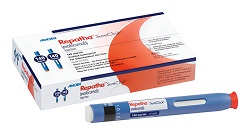 Amgen ($AMGN) is taking its brand-new cholesterol drug into uncharted territory. The drugmaker has negotiated a pay-for-performance deal with the health plan Harvard Pilgrim, gaining an exclusive spot on the payer's formulary in return for an upfront discount and future rebates if Repatha doesn't perform as outlined.
Amgen ($AMGN) is taking its brand-new cholesterol drug into uncharted territory. The drugmaker has negotiated a pay-for-performance deal with the health plan Harvard Pilgrim, gaining an exclusive spot on the payer's formulary in return for an upfront discount and future rebates if Repatha doesn't perform as outlined.
As The Boston Globe reports, Repatha will be the only PCSK9 med covered for Harvard Pilgrim Health Care's 1.2 million members. Amgen and Harvard Pilgrim agreed on specific cholesterol targets for various patient groups, and if Repatha doesn't help patients hit those goals, the insurer can collect additional rebates. More rebates would be due if Harvard Pilgrim's spending on the drug surpasses an agreed-upon threshold.
Harvard Pilgrim figures that only 1% of its members--or about 12,000 people--would be eligible for PCSK9 therapy, and fewer than that would actually sign on for the injectable drug.
This is Amgen's first pay-for-performance deal on Repatha, but the company is working on others.
It's one way Amgen is trying to compete with Sanofi ($SNY) and Regeneron ($REGN), whose head-to-head rival Praluent won approval just before Repatha did. The drugs' high list price--$14,600 for Praluent and $14,100 for Repatha--and their all-but-interchangeable FDA labeling has pharma-watchers expecting heated negotiations for payer coverage.
After all, pharmacy benefits managers Express Scripts ($ESRX) and CVS Health ($CVS) promised as much, months before the PCSK9 drugs' approval, predicting catastrophic spending if the drugs were priced as high as expected and used as broadly as possible. The two top PBMs suggested that they'd trade exclusive formulary placement for big discounts, just as they did with the new generation of hepatitis C drugs.
The PCSK9 meds' list prices came in even higher than the PBMs' mathematical models assumed--at least, the models CVS shared in a Journal of the American Medical Association article--but between discount offers from both companies, and some strict prior authorization procedures, Express Scripts has decided it can afford to cover both. CVS was expected to announce its own decision last month, but hasn't yet.
Perhaps CVS is working on a performance-based deal, too. Harvard Pilgrim CMO Michael Sherman appeared pleased with his deal with Amgen. "This drug is highly effective," Sherman said, "but by any rational benchmark it's overpriced"--pre-discounts and rebates, of course.
The performance approach to pricing seems logical--even attractive--which is why Amgen and Harvard Pilgrim's arrangement isn't unprecedented. In England, the National Institute for Health and Care Excellence has set up a series of cost- and risk-sharing deals with drugmakers; most recently, it struck a deal with Johnson & Johnson's ($JNJ) Janssen unit to cover the hep C drug Olysio, paying for the drug only if patients fully respond within 12 weeks of treatment. Novartis ($NVS) has one performance-based deal on the multiple sclerosis drug Gilenya, and it's been talking up performance-based pricing for its new heart failure drug Entresto.
But in practice, such deals can be difficult to administer, and Novartis has said that U.S. payers have so far been reluctant to make pay-for-performance arrangements on Entresto. A U.K. government report found that the National Health Service had fallen short on clawing back rebates owed under its cost-sharing deals with drugmakers. And as Express Scripts CMO Steve Miller has pointed out, the U.S. health system even lacks the infrastructure to collect the right patient data.
Meanwhile, Sanofi ($SNY) and Regeneron ($REGN) are engaged in their own payer negotiations on Praluent. Sanofi is making "important market access progress," CEO Olivier Brandicourt said during the company's third-quarter earnings call. Decisions from CVS and United Health are pending, Brandicourt said. He didn't mention any efforts toward performance-based pricing.
- read the Boston Globe story
Special Reports: Top 15 pharma companies by 2014 revenue - Sanofi - Amgen | 10 top drugs in biopharma's late-stage pipeline - Alirocumab